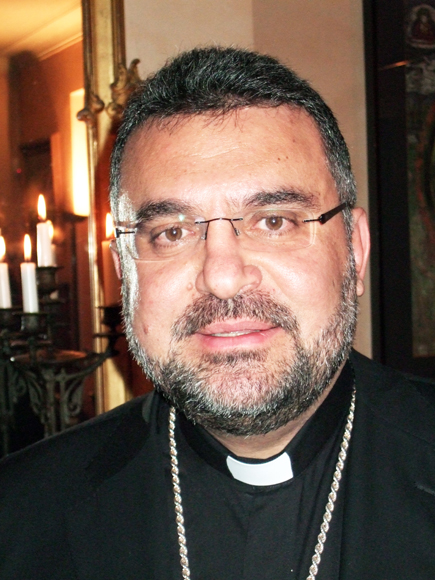MIDDLE EAST
Mons. Soueif, archbishop of Cyprus, attending the CCEE Assembly, described his Country as a “bridge” linking the East and the West. The citizenship “knot”

“Ongoing wars and unsolved political crises in the Middle East can be solved only through dialogue and with citizenship. But this approach requires the support of the international community and of Europe in particular. Churches and civil society must, each in their specific fields, ensure its promotion in all sectors, from the economic sector to the cultural and social ones. It is the only way to reinstate concrete options in this tormented area of the world”. Monsignor Youssef Soueif, Maronite Archbishop of Cyprus, attending the CCEE meeting in the Holy Land, has no doubts: “there is no alternative to dialogue”. His words are especially significant as they come from Cyprus, an island divided since 1974 after the occupation of its northern area by Turkey, but where today Muslims, Orthodox Christians, Greek-Catholics, Maronite and Latin Rite Catholics live together. “It’s an oasis of coexistence that gave Cyprus its identity and its mission, where the Church is committed to promoting a spirit of human reconciliation, forgiveness and peace”. A bridge for the Middle East. The borders of Cyprus extend far beyond the island. Cyprus, a Member of the European Union, the archbishop said, “is a natural geographic bridge linking the East to the West. It’s a gateway to the Middle East, to the Holy Land, Lebanon, Syria, Turkey and Jerusalem. This fact makes us very sensitive to the problems of the region, especially to conflict and persecution that Christian and non-Christian minorities are currently facing. So we try to offer the Middle East a place for understanding and dialogue”. Too bad that “Europe makes little use of this bridge to approach the people of this troubled region from a social, cultural and economic angle. By taking Cyprus as its point of departure, Europe could get closer to the Middle East”. “The future of the Middle East requires dialogue, the purification of memory and respect for human rights”, Msgr. Soueif told SIR Europe. For the prelate, the cause of “all ongoing tensions and conflicts in the region are the Israeli-Palestinian, or Israeli-Arab, conflict”. “Europe could do a lot to promote peace negotiations”. “Pacifying this area means healing the cause of all tensions”. Despite the worsening of the conflict, the “strategic approach” of the Catholic Church to solve it remains the same: “sincere dialogue based on justice, human rights and respect for personal dignity”. The Archbishop addressed a special thought to Jerusalem, the contented holy city, which by its very nature “should be the common patrimony of the entire human family, without distinctions, open to all believers, Jews, Christians and Muslims alike”. The real challenge. Today, the future of the region is threatened also by the wars in Syria and Iraq, by the indiscriminate violence of the Islamic State. However, warned Msgr. Soueif: “These conflicts have a religious connotation, namely the Sunni-Shiite conflict inside Islam, but their roots are economic and political. It takes a heavy toll on millions of refugees and displaced persons who abandoned their homes and left behind all their belongings to escape violence and bombs. Many Christians are among them. Their departure – said the Maronite Archbishop – is a loss for all other faiths and a hard blow to diversity, pluralism and coexistence”. Notwithstanding such violence, brutally displayed by the ISIS cutthroats, Msgr. Soueif reaffirmed the importance of the strategy of dialogue, although he realistically admitted: “There can be no dialogue with extremists and terrorists. However, dialogue is possible with the large majority of Muslims, who are neither extremist nor fundamentalist”. This is the real challenge: “To seek the moderate yet silent majority of Muslims and engage in dialogue with them. A positive dialogue, a dialogue of life, sharing social, cultural and sport projects that may bring people closer, and make them get to know one another. These are our weapons against the knives of the Islamic State. The terrorists – he firmly underlined – are but a minority”. Citizenship rights. But in order to be effective, dialogue should take place on equal grounds. Here, for the archbishop, the concept of citizenship comes into play. This is not to be taken for granted in the Middle East. The appeal of Msgr. Soueif was stated in clear words: “The constitutions and laws of the various countries must be based on the equality of citizens, equal rights for all citizens regardless of ethnicity, political and religious belief. There are no first-class or second-class citizens, as happens to Christians and minority groups. We don’t want to be merely tolerated. We want to be considered citizens in our own right in those lands where, among other things, our presence dates back to long before the arrival of Islam. We are indigenous, not visitors. As Christians we have a role in the religious, historical and cultural realms of the Middle East, that is to be committed for the common good of our society and not only for our own good. Indeed, dialogue on a daily basis and citizenship isolate extremism and fundamentalism”.